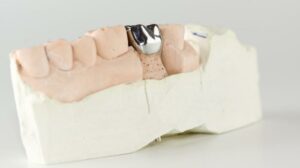How to Care for Your Dental Crowns
Dental crowns are an essential tool that dentists use to restore oral function and aesthetics. Different types of dental crowns include porcelain crowns, metal crowns and resin crowns. Metal crowns are made of a base metal alloy such as nickel, chrome, or alloys of gold and offer good performance, durability, and corrosion-resistance. Ceramic crowns provide a strong aesthetic foundation for restoring teeth because they can be matched in shape and color to surrounding teeth. Composite resin crowns provide excellent strength and stability. Porcelain fused to metal crowns consists of a metal structure with porcelain baked on the outer layer which makes them quite attractive aesthetically while providing strength, flexibility, and resilience for long-term use. Dental crowns play an important role in restoring teeth health and beauty; choosing the right one for your needs is key!
If you’ve recently had a dental crown put in, then you know it’s an important part of your oral health. To keep your dental crown in good condition, it’s important to learn how to properly care for it. Here are some tips on how to do just that.
Brush and Floss Regularly
Just like with your natural teeth, brushing and flossing regularly is crucial for good oral hygiene when you have a dental crown. You should brush twice a day and floss at least once a day to help keep your gums healthy and reduce the risk of decay or infection. It is also important to use the right toothbrush; soft bristles are best for cleaning around the edges of your crown where food can get trapped.
Avoid Hard Foods
Chewing hard foods with a dental crown can cause damage or breakage. Avoid chewing hard objects such as ice cubes or hard candy as these can chip or crack the porcelain material that makes up your crown. Additionally, be sure to avoid sticky and chewy foods as these can pull off the crown if they become stuck in between teeth. This includes items like caramel, taffy, gum, or any kind of hardened candy. Foods with a lot of sugar can also harm your crowns, so it’s best to stick with healthy options like fruits and vegetables as much as possible.
See Your Dentist Regularly
It is important that you schedule your dental visits every six months for regular cleanings and checkups so they can monitor the condition of your dental crowns and make any necessary adjustments or repairs if needed. This will help make sure that your dental crown stays in top shape, preventing further damage down the line. Common maintenance issues that pop up for dental crowns include discoloration, cracks, chips, or loose fit. Discoloration is common over time due to the material used and can be managed by having a professional clean and polish your crown. Cracks or chips are usually caused by biting and chewing forces.
Emergency Dental Crown Situations
If You’ve Got A Loose Crown
if your dental crown is loose it should be considered an emergency and you should contact your dentist right away. Loose crowns can lead to further damage and may need additional treatment before a new crown can be placed. It is best to bring the loose crown with you when you go in for a dental appointment so the dentist can assess the damage and determine the best course of action.
If Your Crown Falls Out
If your crown falls out, it’s important to contact your dentist right away. Your dentist will be able to assess the damage and determine if the crown can be reinserted or if it needs to be replaced. In some cases, the underlying tooth may need additional treatment before a new crown can be placed. It is also important not to try to replace the crown yourself as this can lead to further damage. The best thing to do is to bring your crown and any remaining pieces with you when you go in for a dental appointment.
Proper care of a dental crown is necessary to maintain its structural integrity over time, so be sure to follow these tips for optimal health and longevity of your dental work. If you have any questions about caring for a dental crown, don’t hesitate to ask your dentist during one of your regularly scheduled checkups! With proper care and regular visits with your dentist, you can enjoy clean teeth and strong dental health for years to come!
